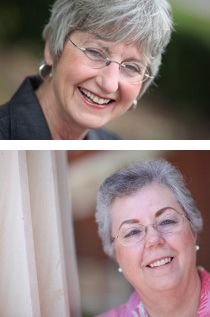
Author Interview with Diana Garland and Gaynor Yancey
Diana Garland and Gaynor Yancey received a 2011 Project Grant for Researchers award to support Social Work with Congregations. Their research resulted in the 2014 book Congregational Social Work: Christian Perspectives.
LI: Tell us about yourselves and your current work.
DG: I began teaching social work in a Baptist seminary in 1979 as part of a small group of faculty bent on developing an accredited graduate social work program focused on church leadership. We did not realize we were pioneers. Social workers had been serving in congregational ministries since the beginnings of the profession in the 19th Century, but few had studied or written about this field of social work. In 1997, I had opportunity to start a new graduate social work program, this time at Baylor University. In the nurturing environment of Baylor University School of Social Work, I have been able to continue to pursue the work we began in 1979. My work has benefited beyond measure from being married to David Garland, a New Testament scholar and theologian. Since the publication of Congregational Social Work, I have turned my attention to another book manuscript, Social Work as Calling, based on interviews with Christian social workers in the diverse fields of our profession, from child welfare to hospice, who see their work as the fulfillment of their Christian calling.
GY: In the early 1970s, several denominations transitioned from almost a century of para-church organizations meeting the needs of the poor and marginalized to having congregations take responsibility for meeting the needs of people. I was in the first group of social workers to practice social work in congregational settings. Ultimately, I became a regional director for Congregational Community Ministries, teaching and equipping congregations for applying the teachings of the gospel to every part of their lives. I worked with congregations in Philadelphia and the five-county region until I started teaching full-time at Eastern University. I moved to Baylor University in 1999 as a faculty member in the new MSW program. Helping congregants and students apply their calling from God in service with marginalized people groups helps me fulfill my calling from God. I continue to target my research and scholarship on congregational social work. I provide leadership for the Congregational Social Work Initiative in our School of Social Work, which is very rewarding and exciting!
LI: What core question/concern guided your research project?
DG & GY: We explored the actual experiences of social workers who are providing professional leadership for congregations. We wanted to develop a full-orbed description of social work as a field of practice and spotlight how social workers can be a resource in congregational missions and ministries. We also wanted to produce a research-based text that educational programs could use in teaching congregational social work.
LI: What would you like us to know about Congregational Social Work: Christian Perspectives?
DG & GY: We wrote the book backward. We began to write a report on a research project designed to describe the field of congregational social work. As we wrote our findings, however, the manuscript grew into a much broader description of this field as we reflected back on (1) what we have learned from our own professional experiences; (2) our understanding of the culture of congregations developed from living more than six decades grounded in congregational life; (3) what our students have taught us as they have practiced social work in congregational settings; and then finally, (4) what we have most recently learned in the congregational social work project.
Our writing was full of surprises, and we think it will be surprising to others. As we studied the stories these congregational social workers told us about their work, we came to understand that congregational social work is a field of practice as diverse as the social work profession itself. We began with the assumption that social workers would be engaged predominantly in the missions and community ministries of the church. Although many were, they were also engaged as worship leaders, Christian educators, and in providing congregational care. We were fascinated to learn from social workers how they had figured out how to put together their professional identities with a call to congregational ministry. We had expected them simply to tell their stories, and did not expect to have our understanding so dramatically altered as we studied the stories of 51 social workers finding their way into this field of practice and how they grew and changed as they served.